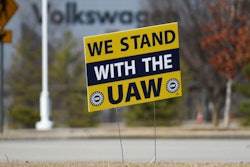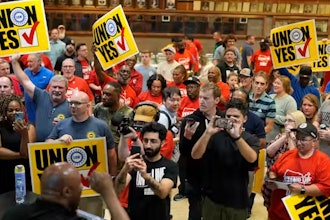WASHINGTON (AP) -- Jose Trivelli, a graying engineer from Peru, spends his days fixing Internet connections at a Tysons Corner hotel and his evenings listening to a laptop computer program with cartoon characters and a chirpy voice that helps him pronounce such phrases as, "I'd like to open an account" and "Let me call my manager."
At 52, he admits to being slightly embarrassed by the simplistic instructional program, but he says his U.S.-born children, who speak perfect English, are so enthusiastic about his efforts that they help him with difficult words and dream of the day he will be promoted to manager.
Trivelli's employer, Marriott International, has a more ambitious motive for offering thousands of foreign-born housekeepers, cooks and maintenance workers its no-cost "Thirst for Knowledge" program, which simulates conversations in banks, hospitals, shops and schools as well as in hotel kitchens and lobbies.
Marriott and another Bethesda-based company, Miller & Long Concrete Construction, are among several dozen major U.S. corporations spearheading a campaign to turn the divisive national debate about immigration in a more positive direction.
"This is a mission for us," said Andy Chaves, a human resources manager for Marriott and a member of the White House Task Force on New Americans. "When our employees become proficient in English and assimilate into our society, it benefits the company, the community and the individual."
Amid increasing public hostility to immigrants and intensifying efforts by local and federal authorities to crack down on illegal immigration, these business leaders hope to counter criticism of immigrants by highlighting the contributions they make and improving their ability to integrate.
Some companies that employ immigrants have been reluctant to associate themselves with the effort, however, citing fears of public criticism and government scrutiny amid increasingly aggressive federal efforts to track down illegal immigrants and punish their employers.
One company that has taken a strong public stance in favor of helping immigrant workers is Miller & Long. Myles Gladstone, the firm's personnel director, said that it once hired mostly African Americans but that since the early 1990s, fewer U.S.-born workers have applied, and they have been largely replaced by immigrants.
Today, it offers 65 free classes, including English, Spanish literacy, job safety, lifesaving, financial skills and health promotion. He said there are plans to expand the program to help immigrants keep their children out of trouble, with seminars on gangs and substance abuse.
He noted that not all immigrants are able to learn English and that of about 500 who have taken the company's language classes, "not a lot" have become truly bilingual. He said that if construction workers are trained well and understand safety, "they don't really need to have fluency in English," although without it they cannot become foremen or crane operators.
Antonia Diaz, 42, has advanced steadily at Miller & Long since she emigrated from Honduras six years ago. She began as a laborer, earning $10 per hour and speaking almost no English. Now, after taking corporate English classes for several years, she is a construction site safety worker and earns $18.50 an hour.
"If I had known I would be talking like this, I wouldn't believe it," Diaz said Aug. 8 in passable English as she built wooden safety barricades around a construction site in Silver Spring. Although she converses with her mostly Hispanic crew in Spanish, she said learning English had other merits.
"It helps me in my personal life," she said. She said she loves her job and plans to stay with Miller & Long but added: "If I know English and I get laid off, I can find other work. I am prepared for anything."
At Marriott, where some hotels have employees from as many as 25 countries, Chairman Bill Marriott calls immigrants the backbone of his business.
"We would hire a native-born person any day, but in most cases they don't want to do the lower-level labor we need in our business," he said in a telephone interview. "Probably the most important thing we can do is offer our employees the opportunity to learn English and grow and become part of our society."






















